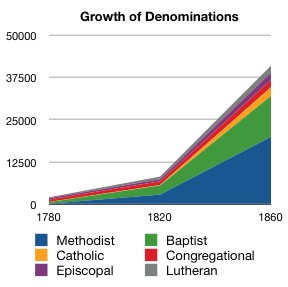Christianity in the United States
Christianity in the United States is a major aspect of the nation's culture and history. The United States has the largest Christian population in the world, with the faith playing a significant role in society, politics, and culture. Christianity's influence is evident in the country's founding documents, public life, and the moral and ethical debates that shape public policy and social attitudes.
History
Christianity was introduced to the Americas by European settlers and missionaries. The Puritans, seeking religious freedom, established one of the earliest Christian settlements in the New England region in the early 17th century. Other Christian denominations, including Catholics, Baptists, and Methodists, followed, each contributing to the religious landscape of the early United States.
The First Great Awakening in the 18th century and the Second Great Awakening in the 19th century were pivotal in shaping American Christianity, leading to a surge in evangelical fervor and the establishment of many new denominations. These revivals played a crucial role in social reform movements, including the abolition of slavery and the temperance movement.
Demographics
Today, Christianity in the United States is diverse, encompassing a wide range of beliefs and practices. The major denominations include the Roman Catholic Church, the Southern Baptist Convention, the United Methodist Church, and various Pentecostal and Evangelical churches. Despite this diversity, a common thread among American Christians is a strong emphasis on individual faith and the importance of a personal relationship with God.
Recent surveys indicate a decline in religious affiliation and church attendance among Americans, a trend often referred to as the "rise of the nones." However, Christianity remains the dominant religion, with a significant majority of Americans identifying as Christian.
Influence on Society and Culture
Christianity has profoundly influenced American society and culture. Christian values and ethics have shaped the nation's understanding of justice, equality, and freedom. Many social movements, including the civil rights movement, were deeply rooted in Christian beliefs.
The separation of church and state is a fundamental principle of the United States Constitution, ensuring religious freedom for all citizens. However, Christianity continues to play a significant role in political debates, including issues related to abortion, same-sex marriage, and religious expression in public spaces.
Education and Media
Christianity also impacts education and media in the United States. Many private schools and universities are affiliated with Christian denominations, and Christian publishing houses and media companies produce a significant amount of religious content, including books, music, and films.
Challenges and Controversies
Christianity in the United States faces several challenges and controversies. The relationship between Christian beliefs and contemporary social issues, such as LGBTQ+ rights and climate change, remains a source of tension. Additionally, the rise of secularism and the decline in church attendance pose challenges to traditional Christian institutions.
Conclusion
Christianity in the United States is a dynamic and influential force, shaping the nation's identity, values, and public life. Despite challenges and changing demographics, it continues to play a vital role in American society.
Transform your life with W8MD's budget GLP-1 injections from $125.
W8MD offers a medical weight loss program to lose weight in Philadelphia. Our physician-supervised medical weight loss provides:
- Most insurances accepted or discounted self-pay rates. We will obtain insurance prior authorizations if needed.
- Generic GLP1 weight loss injections from $125 for the starting dose.
- Also offer prescription weight loss medications including Phentermine, Qsymia, Diethylpropion, Contrave etc.
NYC weight loss doctor appointments
Start your NYC weight loss journey today at our NYC medical weight loss and Philadelphia medical weight loss clinics.
- Call 718-946-5500 to lose weight in NYC or for medical weight loss in Philadelphia 215-676-2334.
- Tags:NYC medical weight loss, Philadelphia lose weight Zepbound NYC, Budget GLP1 weight loss injections, Wegovy Philadelphia, Wegovy NYC, Philadelphia medical weight loss, Brookly weight loss and Wegovy NYC
|
WikiMD's Wellness Encyclopedia |
| Let Food Be Thy Medicine Medicine Thy Food - Hippocrates |
Medical Disclaimer: WikiMD is not a substitute for professional medical advice. The information on WikiMD is provided as an information resource only, may be incorrect, outdated or misleading, and is not to be used or relied on for any diagnostic or treatment purposes. Please consult your health care provider before making any healthcare decisions or for guidance about a specific medical condition. WikiMD expressly disclaims responsibility, and shall have no liability, for any damages, loss, injury, or liability whatsoever suffered as a result of your reliance on the information contained in this site. By visiting this site you agree to the foregoing terms and conditions, which may from time to time be changed or supplemented by WikiMD. If you do not agree to the foregoing terms and conditions, you should not enter or use this site. See full disclaimer.
Credits:Most images are courtesy of Wikimedia commons, and templates, categories Wikipedia, licensed under CC BY SA or similar.
Contributors: Prab R. Tumpati, MD






